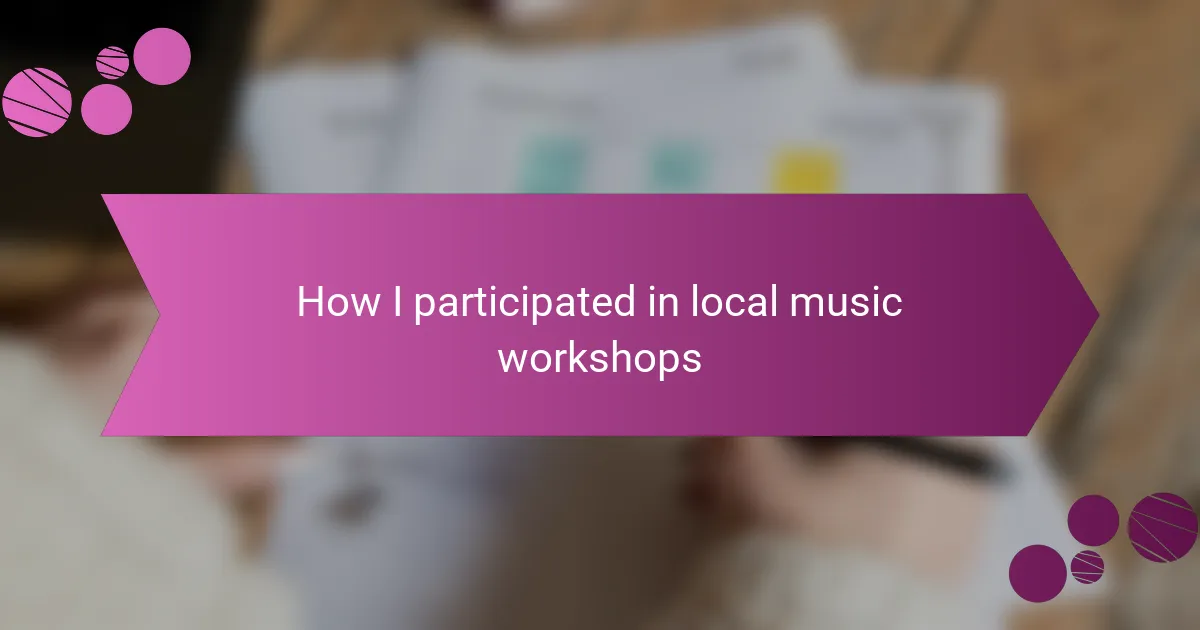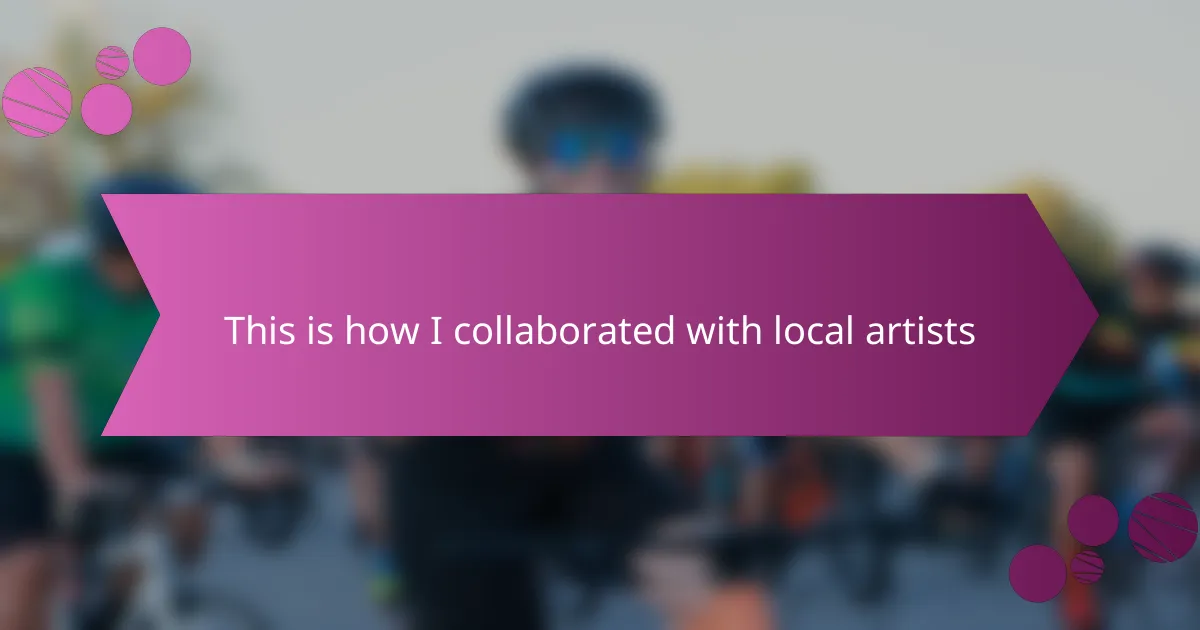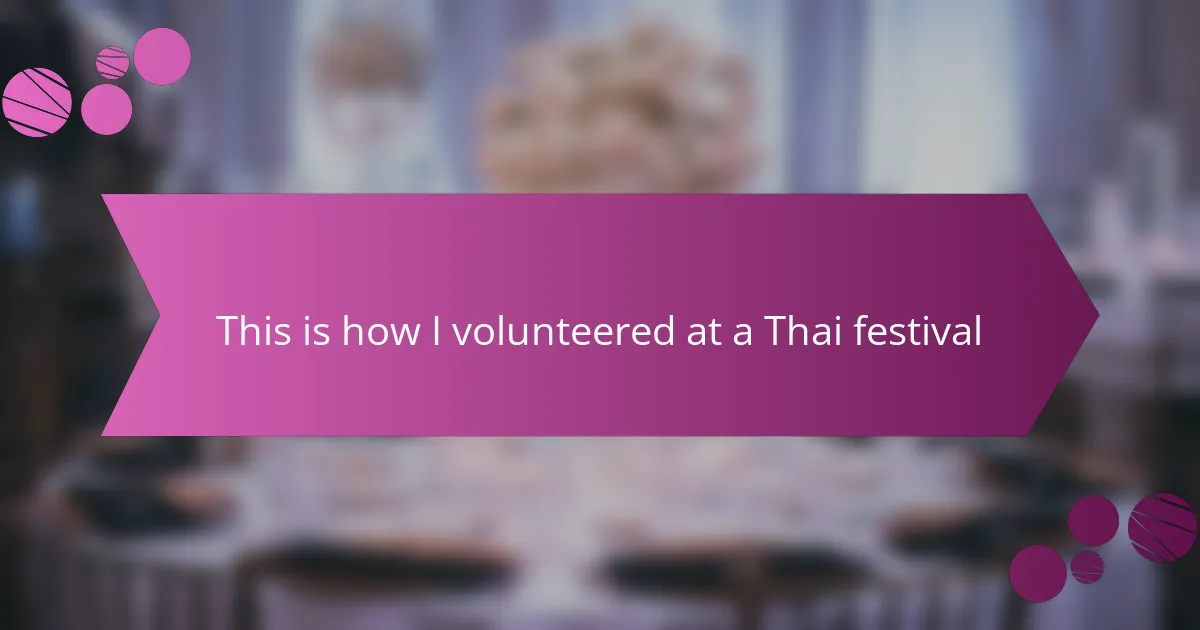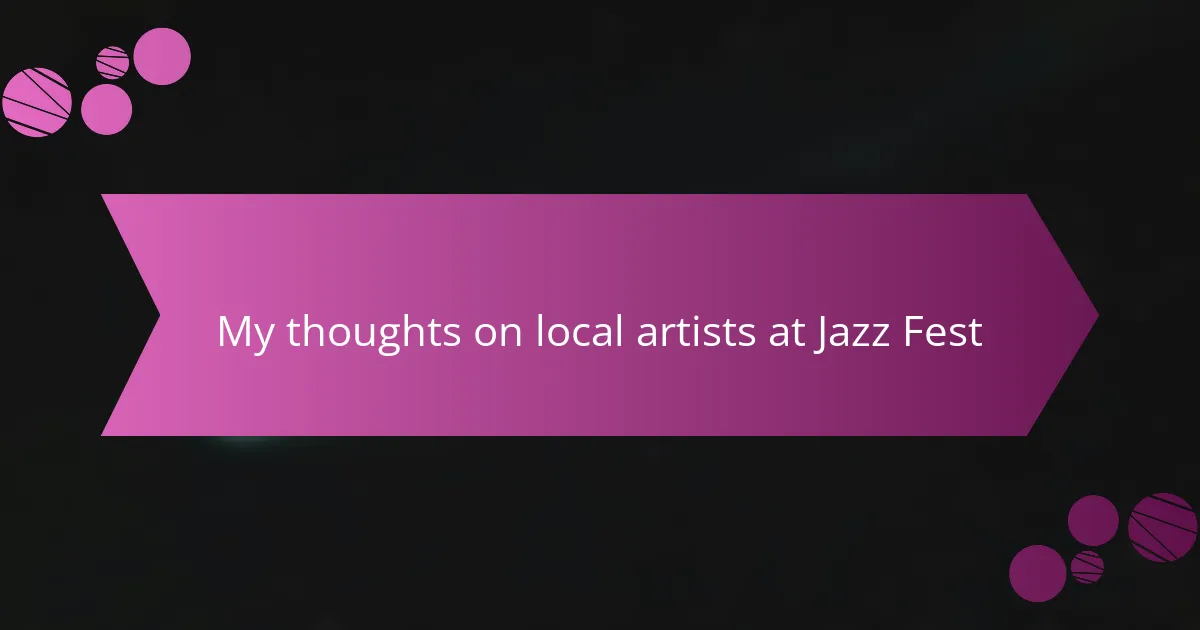Key takeaways
- Thai music festivals celebrate the diversity of music, offering traditional instruments, cultural performances, and local cuisine, fostering community connections.
- Music workshops provide valuable experiences, enhancing technical skills, cultural understanding, and encouraging creative expression within a supportive environment.
- Participating in workshops builds friendships and a sense of belonging among musicians while deepening appreciation for traditional Thai music.
- Various workshops cater to different interests, from traditional instrumentation to contemporary music creation, facilitating personal growth and exploration of diverse genres.
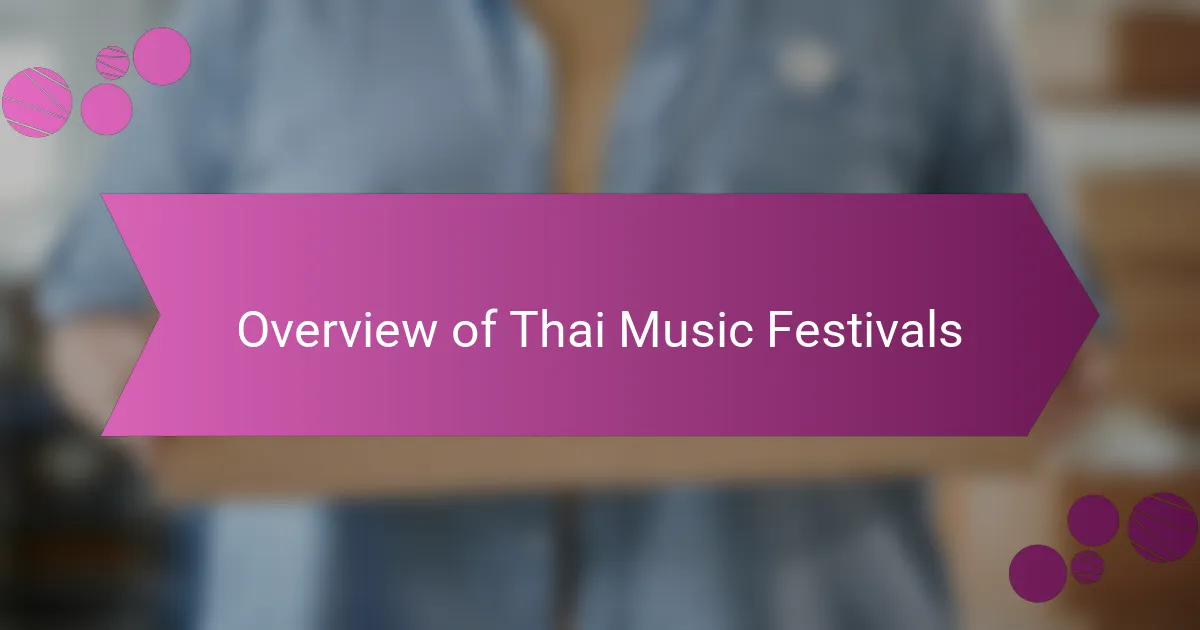
Overview of Thai music festivals
Thai music festivals are vibrant celebrations that showcase the rich diversity of Thailand’s musical landscape, from traditional folk music to contemporary compositions. I remember attending my first festival; the air was filled with the sounds of bamboo instruments and the rhythmic beats of drumming, creating an atmosphere that was both lively and entrancing. Participating in such events not only highlights local talent but also fosters a strong sense of community among attendees.
Throughout the year, various Thai music festivals take place across the country, each with its unique flavor. Here’s a quick overview of what to expect:
- Traditional Instruments: Experience the enchanting sounds of the khaen (a traditional bamboo mouth organ) and the saw u (a bowed string instrument).
- Cultural Performances: Enjoy dance troupes showcasing traditional Thai dances, which often accompany musical performances.
- Workshops and Classes: Many festivals offer hands-on workshops, allowing attendees to learn about instrument-making or even traditional Thai music.
- Local Cuisine: Festival-goers can indulge in a variety of delicious Thai dishes, making it a feast for the senses, both musically and gastronomically.
- Diverse Genres: From classical to modern Thai pop, there’s something for every music lover, ensuring a rich experience that connects different generations.
These festivals are not just events; they’re memorable experiences where stories are shared, and passion for music binds us all together.
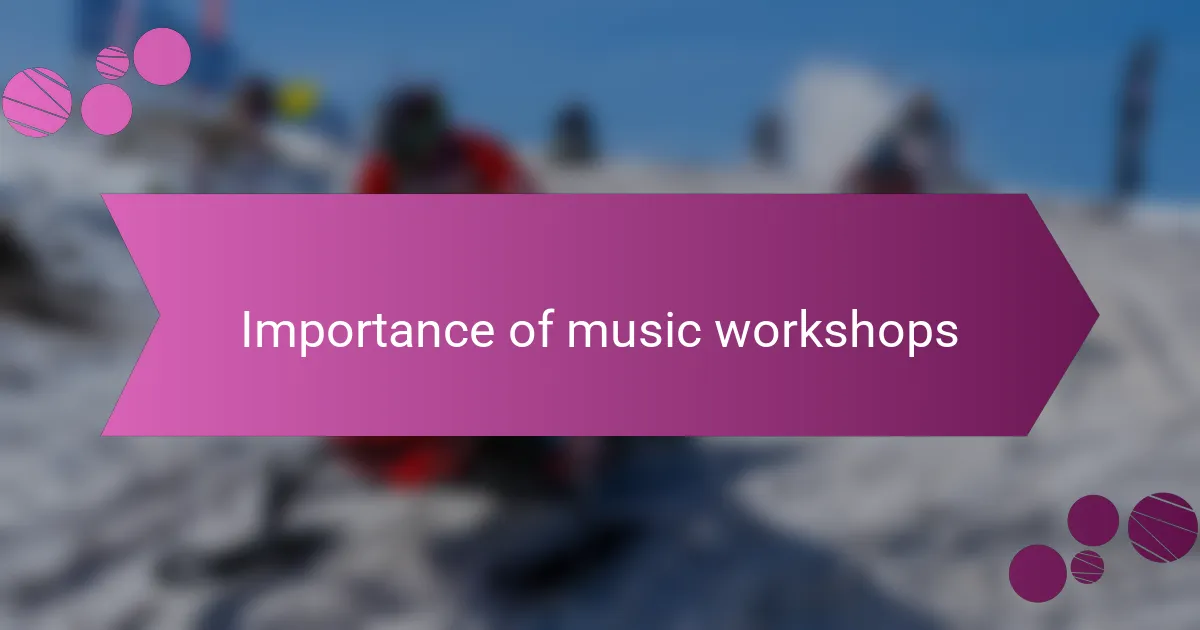
Importance of music workshops
Music workshops hold tremendous value in our communities, serving as a bridge between novice musicians and seasoned professionals. I remember attending my first workshop and feeling a wave of excitement as I connected with others who shared my passion for music. The energy in the room was palpable, fostering an environment where creativity could thrive.
Additionally, workshops emphasize skill development and collaboration, which are crucial for any aspiring musician. They also provide an opportunity to learn about local music styles and traditions, enriching one’s understanding of the cultural significance of the sounds around us. Engaging with others not only enhances my technical skills but also builds lasting friendships that extend beyond the sessions.
- They foster community connections and collaboration.
- Participants gain practical skills and hands-on experience.
- Workshops often feature local musicians, enriching cultural understanding.
- They provide encouragement and support for creative expression.
- Networking opportunities can lead to future collaborations and performances.

Benefits of participating in workshops
Participating in local music workshops has enriched my understanding of Thai music in ways I never anticipated. The first benefit I observed was the hands-on experience with traditional instruments, which truly brought the music to life. Learning from local masters not only enhanced my skills but also deepened my appreciation for the culture and history behind the melodies.
Another significant benefit was the sense of community I found among fellow musicians. Sharing my passion with others who have similar interests led to meaningful friendships and collaborations. I remember those moments when we all played together; it felt like being part of something bigger—a vibrant tapestry woven with diverse backgrounds and experiences.
Lastly, workshops often provide a safe space to experiment and express oneself creatively. I recall stepping out of my comfort zone to improvise and, to my surprise, the supportive environment boosted my confidence significantly. The encouragement from instructors and peers made all the difference, reminding me of the power of music to connect and inspire.
| Benefits | Personal Experience |
|---|---|
| Hands-on learning | Improving skills with traditional instruments |
| Community building | Forming lasting friendships with fellow musicians |
| Creative expression | Gaining confidence through supportive environments |

Types of music workshops available
Attending local music workshops opened my eyes to the diverse range of styles available. From traditional Thai music to contemporary genres, each session offered something unique. I remember the first time I strummed a khim; the sound resonated within me, making me feel deeply connected to the culture.
Various types of music workshops cater to different interests and skill levels. Here are some that I found particularly enriching:
- Traditional Thai Instrumentation: Learn to play famous instruments like the ranad and the pi phat.
- Contemporary Music Creation: Explore songwriting and production techniques in a modern context.
- Vocal Techniques: Focus on enhancing your voice with local singing styles.
- Fusion Workshops: Combine traditional Thai music with other genres for innovative compositions.
- Performance Masterclasses: Gain insights on stage presence and performance skills from experienced artists.
Each of these experiences not only honed my skills but also deepened my appreciation for the vibrant tapestry of Thai music.

My experience in local workshops
Participating in local music workshops has been a transformative experience for me. I remember the first time I walked into a small community center filled with the sound of traditional Thai instruments. There was such an inviting atmosphere; it felt like stepping into a world where everyone shared a common passion for music. I connected with both seasoned musicians and eager beginners, which created a sense of camaraderie that I truly cherished.
In one workshop, we explored the intricacies of playing the khim, a beautiful hammered dulcimer unique to Thai music. I was amazed at how quickly I found joy in the melodies, despite initial struggles. Each strum resonated within me, allowing me to express emotions I had a hard time articulating. It was this blend of learning and personal expression that made each session unforgettable.
Reflecting on different workshops has made me realize how each one offered not just skill development but also a sense of community and cultural appreciation. I’ve come to truly value the shared stories and experiences that emerge in these spaces.
| Workshop Aspect | My Experience |
|---|---|
| Instructors | Supportive and knowledgeable, sharing personal anecdotes that enriched our understanding of Thai music. |
| Participants | A mix of ages and backgrounds, creating a vibrant learning environment filled with encouragement. |
| Instruments Used | Exploration of traditional instruments like the khim and ranat, making each session unique. |
| Emotional Impact | Each workshop left me feeling inspired, connected, and in tune with my cultural roots. |

Skills I gained from participation
Participating in local music workshops was a transformative experience for me. I gained a deeper appreciation for traditional Thai instruments, noticing how they create a rich tapestry of sound that tells a story. I learned the importance of collaboration, as working with other musicians opened my eyes to different styles and techniques.
One memorable moment was when a fellow participant encouraged me to improvise during a jam session. It was nerve-wracking at first, but once I started, I felt a rush of creativity that I hadn’t experienced before. This helped me develop my confidence and ability to think on my feet musically.
Here’s a comparison table that reflects the skills I gained from my participation in these workshops:
| Skills | Description |
|---|---|
| Musical Technique | Improved my proficiency with traditional Thai instruments. |
| Collaboration | Learned to communicate and create with other musicians. |
| Improvisation | Gained confidence in spontaneous musical expression. |
